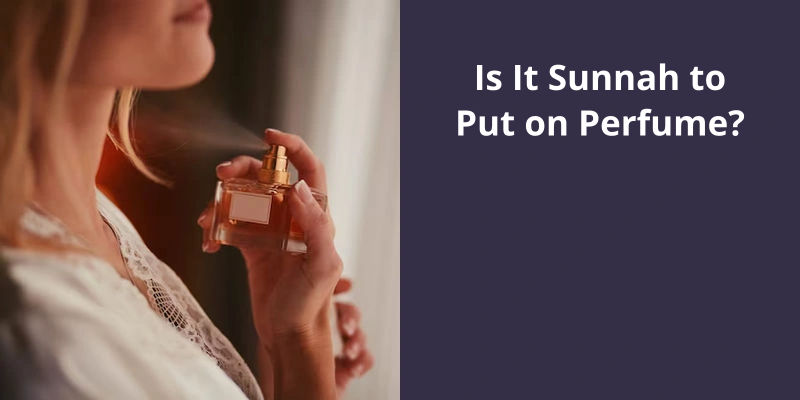Yes, it is Sunnah to put on perfume. Sunnah refers to the actions and teachings of Prophet Muhammad in Islam, and he is reported to have used perfume and encouraged its use among his followers. He regarded cleanliness and good scent as important, often applying it before going to the mosque for prayers. However, while it is recommended for men to wear strong scents, women are advised to wear lighter, less noticeable scents to avoid attracting attention in public. So, putting on perfume is considered a good practice within Islam, as long as it is done appropriately and modestly.

What Is Sunnah About Perfume?
Using perfume is considered a Sunnah in Islam. The Prophet Muhammad (peace be upon him) himself frequently wore perfume and encouraged his followers to do the same. It’s believed that wearing perfume pleases Allah and adds to a persons overall cleanliness and hygiene.
The Prophet Muhammad never refused perfume when it was presented to him. This demonstrates the importance of accepting gifts and showing gratitude to others. It also highlights the Prophets exemplification of good manners and kindness towards others.
However, it’s essential to be mindful of peoples sensitivities and allergies when offering perfume. While perfume may be pleasing to some, it can be overpowering or bothersome to others. Therefore, it’s crucial to use discretion and respect individuals preferences and sensitivities. This may involve asking if someone is comfortable with perfume or refraining from using it if it’s known to cause discomfort to others. Being considerate of the well-being and comfort of others is a fundamental aspect of Islamic teachings.
By practicing these etiquettes, Muslims can adhere to the Sunnah and also demonstrate kindness and consideration towards others.
Perfume holds a special place in Islam, as it isn’t just a means of personal adornment but also a way to follow the teachings of the Prophet Muhammad (peace be upon him). Embracing the use of fragrance not only enhances a Muslim’s physical appearance, but it also has spiritual and social significance. This article delves into the importance of perfume in Islam, exploring it’s role in achieving goodness in both this life and the hereafter, while cultivating a pleasant demeanor.
What Does Islam Say About Perfume?
In Islam, the use of perfume isn’t only a cultural practice but also carries a significant religious significance. By adhering to this Sunnah (prophetic tradition), Muslims not only enhance their physical appearance but also attain spiritual and emotional benefits.
The Prophet Muhammad (peace be upon him) would apply perfume before attending these special occasions, emphasizing it’s importance. This act is considered a Sunnah and is highly recommended for Muslims to follow.
Interestingly, the use of perfume isn’t limited to personal benefits but extends to the well-being of those around us. The pleasant aroma of perfume has the potential to uplift the mood and relieve stress, benefiting both the wearer and those in their vicinity.
The Types of Perfumes Recommended in Islam
In Islam, wearing perfume is considered a sunnah, which means it’s a recommended act. It’s believed that the Prophet Muhammad encouraged the use of pleasant scents. However, there are guidelines for the types of perfumes that are recommended in Islam.
The perfumes recommended in Islam should be free from any impurities that may be considered forbidden in Islam. This includes ingredients derived from animals that aren’t permissible to consume, as well as any alcoholic content. It’s also advised to avoid excessively strong or overwhelming scents, as moderation is encouraged in all matters.
Furthermore, it’s recommended to apply perfume in a manner that doesn’t attract unnecessary attention or provoke lustful desires. Perfume should be used primarily for personal enjoyment and to enhance one’s own cleanliness and hygiene. It’s also encouraged to apply perfume before attending religious gatherings or when engaging in acts of worship.
Source: The Prophet’s Method of Using Perfume
Perfume holds a significant place in Islamic culture, with teachings emphasizing modesty and discouraging actions that may lead to temptation. Many scholars interpret the hadith as cautionary advice for women to avoid wearing perfume in public or while attending mosques to uphold modesty and prevent any unnecessary attention from men. Understanding these teachings and their significance is fundamental in navigating the boundaries set forth by Islam regarding perfumes and personal adornments.
Is It OK to Wear Perfume in Islam?
Is it Sunnah to put on perfume? This question has been a subject of debate within the Islamic community for centuries. Based on various translations of the hadith, it’s stated that a woman isn’t to wear perfume in public that can attract the attention of men. Scholars have also established various hadith that warn women against wearing perfume to the mosques for the same reason.
The idea behind this prohibition is to ensure modesty and prevent any potential distraction or temptation for men. Islam emphasizes the importance of maintaining a respectful and wholesome environment, especially within places of worship. By refraining from wearing perfume, women can contribute to this atmosphere of piety and avoid any unnecessary attention.
However, there are differing opinions and interpretations on this matter. Some scholars argue that the prohibition only applies if the scent is so strong that it becomes noticeable from a distance. Others believe that it’s permissible to wear perfume as long as it isn’t overly seductive and doesn’t draw undue attention.
The Perspective of Men in Islam on Women Wearing Perfume
In Islam, the perspective of men towards women wearing perfume is generally considered positive. The use of perfume is highly encouraged as it enhances personal hygiene and adds to the overall appeal. Additionally, the Prophet Muhammad (peace be upon him) is known to have enjoyed the fragrance of perfumes and encouraged it’s use. However, it’s important for both men and women to be mindful of modesty and not to indulge in excessive or provocative scents that may attract unnecessary attention or violate Islamic principles.
According to historical accounts, the Prophet Muhammad (SAWA) held a great admiration for perfumes and considered them among his beloved possessions. Interestingly, it’s said that he’d allocate a higher portion of his expenditure on perfumes compared to food. In his teachings, he emphasized that spending on fragrances was not a form of excessive indulgence, but rather a permissible way to enhance one’s personal hygiene and refreshment. This unique perspective sheds light on the Prophet’s careful consideration of balance and moderation in all aspects of his life.
Did the Prophet Spend More on Perfume Than Food?
The Prophet Muhammad (SAWA) embraced the beauty and fragrance of perfumes, making it a cherished aspect of his life. It’s said that the Prophet used to prioritize spending on perfumes over food, highlighting it’s significance to him. In fact, he emphasized that there was no sin in indulging in the purchase of perfumes, as there was no wastefulness in this regard. This showcases how much he valued the power of scents in elevating ones mood and enhancing ones spiritual connection.
By doing so, he demonstrated the profound impact that perfumes can have on ones spiritual state and overall demeanor. The fragrance of perfumes was thus considered a means of beautifying oneself not only externally but internally as well.
The Significance of Fragrance in Islamic Culture and Traditions.
Perfume holds immense significance in Islamic culture and traditions. It’s considered Sunnah (a practice of the Prophet Muhammad) to wear fragrance and smelling good is highly encouraged. Prophet Muhammad himself loved to apply perfume and encouraged his followers to do the same. Wearing perfume is seen as a way to enhance personal hygiene, maintain good manners, and express self-care. The fragrance is also associated with spirituality, as it’s believed to elevate the soul and create a pleasant atmosphere. However, it’s important to use fragrance modestly and not to overpower others with a strong scent. Overall, wearing perfume isn’t only seen as a personal preference but also as a reflection of Islamic values and etiquette.
He appreciated cleanliness and had a fondness for pleasing scents. It’s documented in various Hadith that the beloved Prophet Muhammad (صلى الله عليه وسلم) had a particular liking for the fragrances of Musk and ambergris. Moreover, he graciously accepted perfume gifts without hesitation, reflecting his gracious nature and appreciation for thoughtful gestures.
What Perfume Did the Prophet Like?
He’d wear it and appreciate the pleasant scent. The Prophet (صلى الله عليه وسلم) is known to have used different types of perfumes, including those made from natural ingredients like flowers and plants. He understood the importance of personal hygiene and cleansing oneself, both physically and spiritually.
Perfume holds a significant place in Islamic culture and traditions. It isn’t just a means to smell good, but it’s a deeper purpose. The Prophet Muhammad (صلى الله عليه وسلم) himself emphasized the importance of cleanliness and pleasant scents. The fragrance of musk and ambergris has been mentioned in various Hadiths as being his favorite.
Wearing perfume is considered a Sunnah, which means it’s highly recommended in Islam. It’s a way of taking care of oneself and showing respect for others.
Excessive use or using intoxicating scents is discouraged in Islam. The main intention should be to smell pleasant and fresh without causing inconvenience to others.
The Different Types of Perfumes and Their Scents That Were Popular During the Prophet’s Time.
- Misk: Known for it’s strong and musky scent.
- Saadat: A perfume with a floral fragrance.
- Amber: Renowned for it’s warm and earthy aroma.
- Tayef: Often extracted from Ta’if roses, offering a sweet and captivating scent.
- Bakhoor: A traditional incense with a rich smokey fragrance.
- Farah: A perfume derived from flowers, providing a refreshing and delightful scent.
- Sandal: Made from sandalwood, known for it’s woody and aromatic notes.
- Jasmine: Popular for it’s sweet and exotic fragrance.
- Oud: Highly valued for it’s strong and woody aroma.
- Rose: One of the most beloved scents, offering a soothing and romantic smell.
- Civet: A perfume derived from the musk gland of civet cats, often used in combination with other scents.
- Saffron: Known for it’s warm and spicy scent.
Conclusion
By following this prophetic tradition, Muslims can experience not only an enhancement in their physical appearance but also a deeper connection with their spirituality. Adhering to this Sunnah not only brings about pleasantness in one's demeanor and interactions but also contributes to a sense of inner peace and fulfillment. In short, putting on perfume can serve as a means to achieve goodness in this life and the hereafter, while also drawing nearer to the Almighty.





